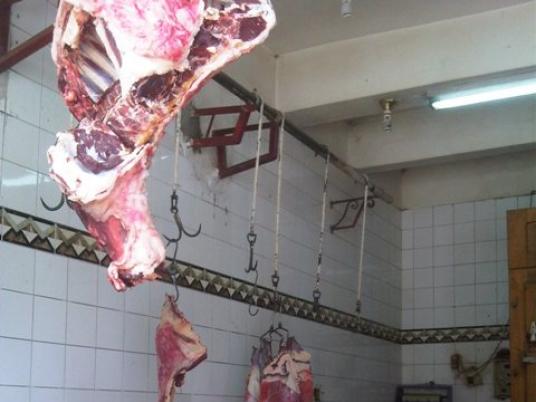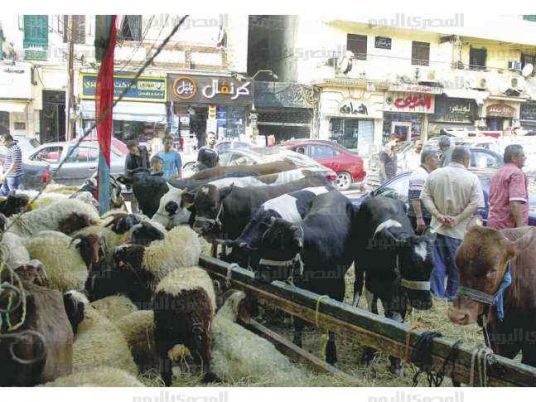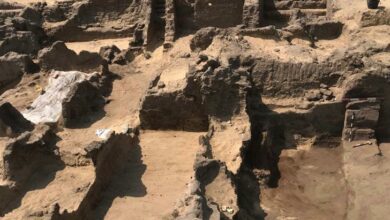
Meat markets in the busy Galaa Street of Shebin al-Kom, the capital city of Monufiya Governorate, remain empty, in contradiction to recent government reports that the outbreak of foot-and-mouth disease is under control there and in several other governorates.
Although this governorate is one of the few regions in Egypt where residents say they have managed to curb the outbreak of the virus, the scare around the outbreak means meat is no longer a welcome food on Monufiya residents’ plates.
Dr. Salah Kabeel, director of the Veterinary Medicine Directorate in Monufiya, told Egypt Independent that the number of infections has dropped greatly in this Delta governorate.
Kabeel said the progress was a result of a widespread immunization plan implemented by the government.
Kabeel stressed that immunizations throughout the governorate are being administered according to a tight schedule.
“The directorate has formed committees to follow up on all the villages and centers and to conduct outreach programs to educate farmers about the seriousness of the disease,” Kabeel said.
Kabeel said in recent days there have only been five to nine new cases reported in the governorate, compared to the daily 30 to 40 cases of the last two weeks. He said 1,785 cases have been cured and 203 are currently being treated.
In this governorate, which is known for growing cotton and being the birthplace of the two most recent Egyptian presidents — Anwar Sadat and Hosni Mubarak — meat markets showed a severe 70 percent drop in meat sales.
The rapid spread of foot-and-mouth disease among cows and sheep has deterred consumers from buying meat and pushed them toward poultry and fish, causing a hike in prices of the alternative protein options. And though the outbreak might be subsiding, it’s unclear how long customers will fear to put meat back on the table.
Mina Talaat, a 67-year-old retired officer, said he has grown used to yearly outbreaks of disease, recalling the spread of bird flu about five years ago, then followed by swine flu and now the foot-and-mouth virus.
“For years, the poultry sector in Egypt has suffered from the H5N1 bird flu epidemic, so it is its turn now to be revived a little bit,” Talaat joked wryly.
However, Nafaa Ayad, a live poultry trader, said he had not seen any remarkable increase in prices or demand. He attributed a slight rise in demand to customers just now starting to buy poultry again after the economy slump that followed the country’s uprising last year.
“The whole market after the revolution is very slow — people renounced buying meat and chicken for quite some time now,” Ayad told Egypt Independent. “This slight rise can’t be blamed on the increase demand for poultry after the spread of the disease.”
Monufiya and other agriculture heavy areas of the Lower Nile Delta were among those most severely affected by the virus, according to a statement released last week by the Food and Agriculture Organisation. Upper Egypt and other regions were not hit as bad, the statement said, but it warned of further serious implications for food security in the whole region.
The United Nations agency, which sent an emergency team at the request of the Egyptian government to assess the situation, suggested a new disease containment strategy focusing on limiting the spread through various measures, including vaccination.
Engineer Mohamed Halawa was one of a handful of brave customers who entered El Hoda butchery.
“I boycotted meat for one month now, but when I saw the agriculture minister on TV explaining the rare occurrence of transmission of the disease to humans, I resumed eating meat again,” Halawa said.
Dr. Amr Kandil, head of the Health Ministry Preventive Medicine Department, said that cases of transmission of foot-and-mouth disease from animals to humans are extremely rare.
“There were only four cases reported throughout history, so no need to panic,” Kandil said.
A colorful poster covers the entrance to the veterinary medicine department of Shebin al-Kom, showing the different symptoms and stages of the disease. The poster is part of the Health Ministry’s plan to raise awareness about the epidemic.
Dr. Hussein Mahmoud, veterinary doctor at the General Quarantine Department, said the ministry is making extraordinary efforts to contain the spread of the virus and educate farmers.
“The situation is not entirely new; foot-and-mouth disease has been circulating in the country for a few years now,” he said. “What is new this year is the number of affected cattle and introduction of the new virus strain, which meant it took longer to immunize the livestock.”
For several years, there has been a large deficit between local meat production and consumption in Egypt, which was mostly covered by large imports. Egypt is currently one of the top of meat importers in the world.
Monufiya was one of the governorates to participate in the government-sponsored “Veal Project,” introduced in 1982 as a long-term solution to increasing local meat production. The project gave breeders’ small loans to raise cattle, send the meat back to the government, which would then sold the meat in official outlets at reduced prices.
But the project was suspended in favor of a shorter-term solution of importing meat from other countries.
The current foot-and-mouth outbreak presents a risk to about 6.3 million buffalo cattle and 7.5 million sheep and goats in Egypt. The disease is described as a highly contagious viral vesicular disease of cloven-hoofed animals. Although seldom lethal in adult animals, it causes serious production losses and is a major constraint in international trading of livestock products.
The latest report from the General Authority for Veterinary Services raised the number of infected animals to more than 61,000 animals, finding more than 10,000 have died from it.
However, the report also found that the import of live animals from Sudan and Ethiopia is not responsible for introducing the foot-and-mouth strain to Egypt. Researchers did not find any links between the disease and animals brought from the country’s ports.
In the government efforts to contain the crisis, Prime Minister Kamal al-Ganzouri held a meeting with cabinet members last week, during which Agriculture Minister Mohamed Reda Ismail announced that the vaccine to combat foot-and-mouth disease will be produced locally.
In the meeting, Ganzouri confirmed that the government is currently considering methods to compensate farmers.
“Compensation will be given based on reports by veterinarians or by the veterinary unit in each governorate, and not through complaints filed at police stations,” Ganzouri announced.
Farmers are not required to be compensated for foot-and-mouth disease infections under Egyptian law, but the government is considering ways to compensate farmers, he said, especially after ruling military leader Field Marshal Hussein Tantawi promised to solve the problem.
With a relative improvement in the situation, many experts say the foot-and-mouth crisis could end in early April because warmer temperatures might help deter the disease.




